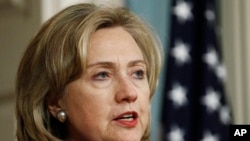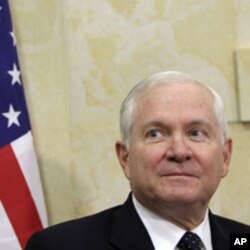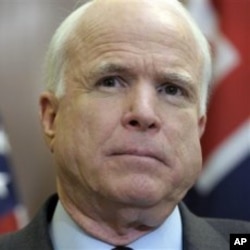The Obama administration is defending its decision to intervene militarily in Libya, despite admitting that no vital U.S. interests are at stake in the country.
One day before President Barack Obama is to speak to the nation on U.S. efforts in Libya, Defense Secretary Robert Gates was asked if turmoil and bloodshed in Libya posed a threat to the United States.
"No, no. It was not a vital national interest of the United States. But it was an interest: the engagement of the Arabs [Arab League], the engagement of the Europeans, the general humanitarian question that was at stake," he said. "You have had revolutions on the east and the west of Libya, Egypt and Tunisia. So you had a potentially destabilizing event taking place in Libya that put at risk, potentially, the revolutions in both Tunisia and Egypt. And that was another [U.S.] consideration."
Gates spoke on ABC’s This Week television program, as did Secretary of State Hillary Clinton, who noted what might have happened without intervention in Libya.
"Imagine [if] we were sitting here, and Benghazi had been overrun, a city of 700,000 people, and tens of thousands of people had been slaughtered, hundreds of thousands had fled with nowhere to go or overwhelming Egypt while it is in its own difficult transition," she said. "If we were sitting here [passively], the cries would have been, ‘Why did the United States not do anything?'"
Establishing the no-fly zone over Libya has the backing of the top Republican on the Senate Armed Services Committee, John McCain of Arizona.
"We could quibble over the definition of vital interests," he said. "We said after Srebrenica [1995 massacre in former-Yugoslavia]: never again. After Rwanda: never again. And after the Holocaust: never again. The fact is that [Libyan leader Moammar] Gadhafi’s forces were on the outskirts of Benghazi. He said himself he would go house-to-house and kill and murder people. Thank God, at the 11th hour with the no-fly zone, we prevented that from happening.
McCain spoke on Fox News Sunday.
Some U.S. legislators have decried the Obama administration’s use of force abroad without first obtaining formal congressional consent. But Senator McCain had been urging the Obama administration to act weeks before the United Nations Security Council authorized intervention in Libya to prevent the slaughter of government opponents.
"If you had allowed Gadhafi to do that, it sends a signal to the other leaders in the Middle East, dictators, [that] it is OK to massacre your own people to stay in power," added McCain. "Look, this is a moment of historic proportions. And this will give us a golden opportunity to help with democracy and freedom throughout the Arab world."
With NATO assuming lead responsibility for operations over Libya, Defense Secretary Gates says the United States will begin to scale back some operations. Asked whether the mission will be over by the end of the year, Gates said, "I do not think anybody knows the answer to that."






